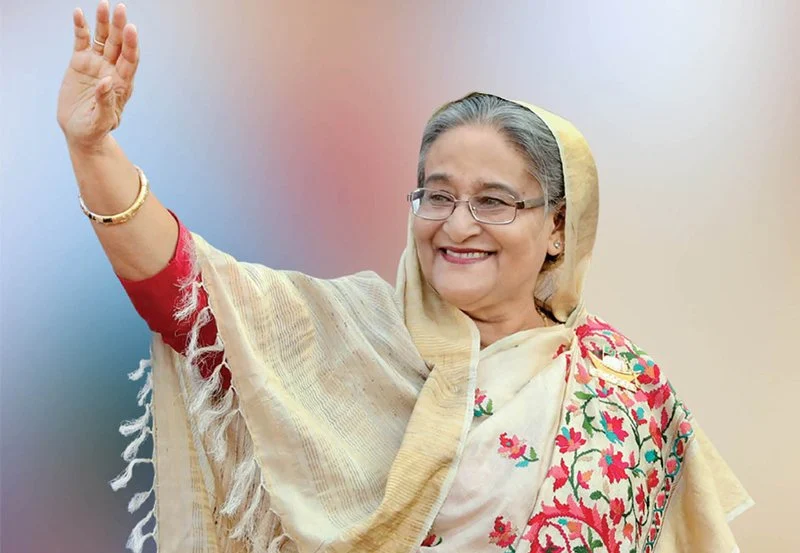Bangladesh’s International Crimes Tribunal has taken a significant step by issuing an arrest warrant for former Prime Minister Sheikh Hasina, who is currently residing in India. This warrant is based on allegations of her involvement in mass killings during widespread protests that erupted earlier this year. The protests were initially sparked by a student-led movement advocating for reforms in public sector job quotas, which quickly escalated into violent clashes that have been described as some of the deadliest unrest in the nation’s history since gaining independence in 1971. The turmoil has reportedly led to over 700 fatalities and countless injuries, highlighting the severity of the situation.
As the violence intensified, it forced Sheikh Hasina to flee to India on August 5, a move that has dramatically shifted the political landscape in Bangladesh. Following her departure, an interim government was established, headed by Nobel Peace Prize laureate Muhammad Yunus. This government was formed amid fears of further escalation in violence and a breakdown of law and order, demonstrating the extent of public discontent and the challenges facing the country’s leadership during this turbulent period.
The tribunal’s proceedings, overseen by Justice Golam Mortuza Majumdar, revealed a coordinated effort by prosecutors to hold influential figures accountable for the unrest. They submitted a request for arrest warrants for 50 individuals, with Hasina being a primary target. Chief prosecutor Mohammad Tajul Islam expressed concerns about the ability to conduct a thorough investigation if these influential figures remained at large. He emphasized the necessity of their arrest to ensure that the legal process could move forward without obstruction.
In response to the prosecution’s request, the tribunal granted the appeal, ordering the arrest of Sheikh Hasina and mandating her presence in court by November 18. This development marks a significant escalation in the legal proceedings surrounding the unrest and underscores the ongoing political tensions within Bangladesh. The outcome of this case could have far-reaching implications for the country’s political future and the rule of law, as it confronts the complex interplay of power, accountability, and public unrest.
More than 60 complaints have been filed against former Prime Minister Sheikh Hasina and other leaders of her Awami League party, alleging serious crimes such as enforced disappearances, murder, and mass killings. These allegations represent a growing backlash against the ruling party amidst escalating political tensions in Bangladesh. The complaints highlight the serious accusations that have surfaced during the current unrest, which has seen widespread calls for accountability and justice for the victims of violence.
However, responses from the Awami League have been limited, as many senior party members have either been arrested or have gone into hiding, leaving the party’s leadership effectively paralyzed. The absence of official comments from party leaders underscores the precarious situation they face amid these mounting legal challenges. This silence may also reflect the fear of repercussions as the political climate in Bangladesh grows increasingly hostile.
In an August statement, Hasina’s son, Sajeeb Wazed, expressed confidence in his mother’s innocence, asserting that she is prepared to face trial in Bangladesh. “My mother has done nothing wrong,” he told Reuters, defending her against the multitude of accusations that have emerged. Wazed’s remarks illustrate the familial support for Hasina as well as a desire to contest the allegations head-on, suggesting a determination to clear her name in the face of serious charges.
On Thursday, Bangladesh’s de-facto foreign minister, Mohammad Touhid Hossain, addressed the situation, emphasizing the government’s commitment to repatriating Hasina from India within the one-month timeframe mandated by the tribunal. “The tribunal gave one month time. We will definitely try to bring her back in the meantime; we will do whatever it takes for us,” he told reporters. This statement indicates that the government is taking a proactive approach in managing the fallout from the tribunal’s decision and is focused on maintaining political stability.
The situation remains fluid as the government navigates the challenges posed by the ongoing legal proceedings and public unrest. The developments surrounding Hasina and the Awami League could significantly impact the political landscape in Bangladesh, particularly as public sentiment shifts and calls for accountability grow louder. The outcome of these events may not only shape the future of Hasina’s political career but also influence the broader dynamics of governance and civil rights in the country.

